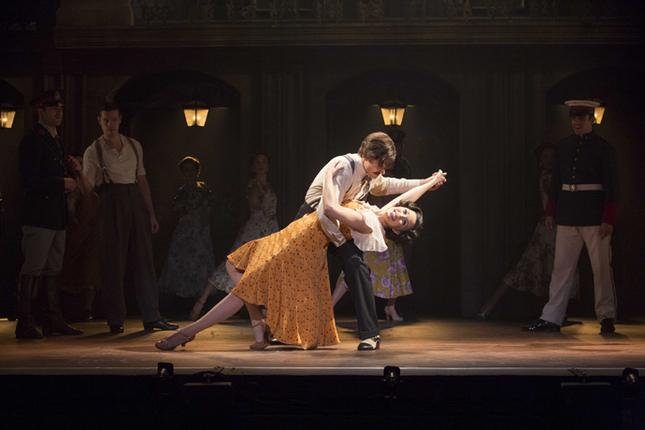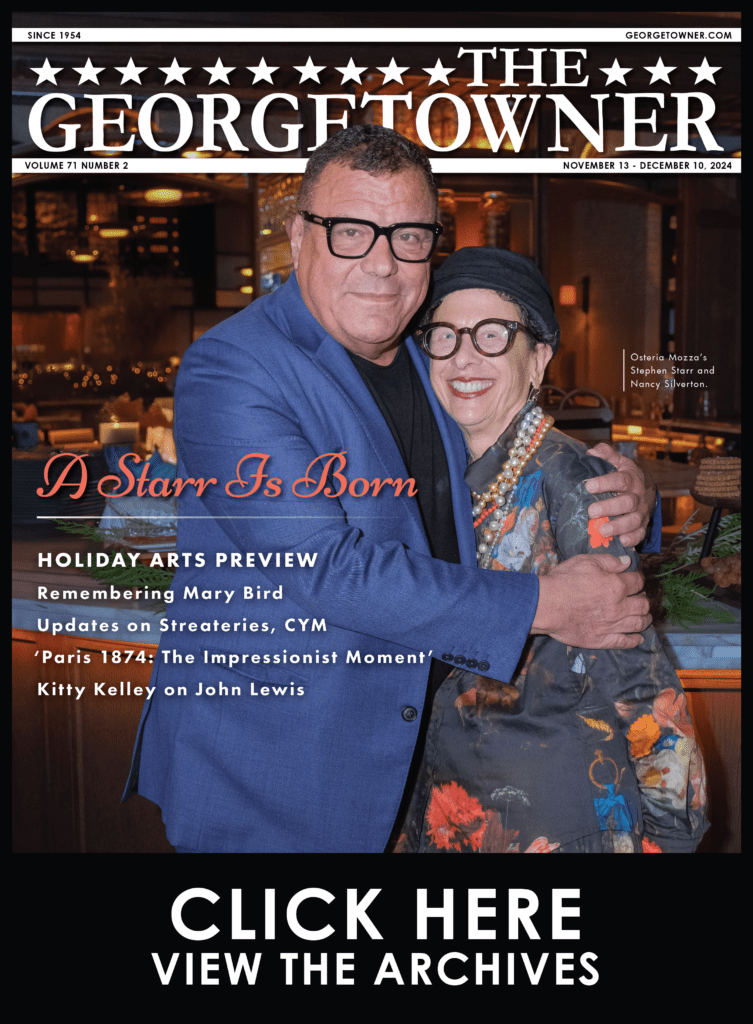Fresh, Energetic, Seductive ‘Evita’ at Kennedy Center
By • October 28, 2014 0 989

“Evita,” the Andrew Lloyd Webber and Tim Rice mega musical from about the rise of the up-from-nothing wife of Argentine dictator Juan Peron, is back at the Kennedy Center’s Opera House in an electric, energetic, tango-flavored production that feels remarkably fresh.
To paraphrase the seductive song Eva purrs to Peron in suggesting a romantic-physical and political partnership, the show, directed by Michael Grandage from a West End production of several years back, was “surprisingly good for audiences.”
Historically, “Evita” marked the beginnings of the ascendancy of hefty, blockbuster English musicals like “Phantom of the Opera”, “Cats”, “Starlight Express” (“Cats” on roller skates), “Miss Saigon” and the omni-present “Les Miserables”, which dominated Broadway for a couple of decades. They were not really musicals, but pop (and sometimes rock) operas, fueled by high drama, big, splashy staging (the chandelier in “Phantom”, the barricades in “Les Miz”, the helicopter in “Miss Saigon”).
There have been few if any shows to match the success of the Rice, MacIntosh and Webber days. So, it’s probably good to see “Evita” resurrected. If you’ve seen the show back in the day, in various incarnations, or the Madonna film version, you’ll wonder how it holds up. If you haven’t seen it all, or know little about Evita Peron, the show should be an eye-opener.
Does it hold up? Yes, it does, and the reason is a highly effective cast, headed by young star Caroline Bowman in the title role, and the choreography of Rob Ashford, who gives the proceedings on stage a highly stylized energy.
It’s got fizz and buzz, moving to the sharp-and-high stepping rhythms of the tango, the dance and music that has always defined the national personality of Argentina.
Bowman does a transformation here—starting out as an ambitious Eva, eager to get out of her small town, using men dispassionately along the way as she hooks up with a pop singer to make her way to Buenos Aires, where politicians, usually wearing a uniform, abound. She becomes a singer, a radio star and eventually, man by man, a sexpot in the position to say: “Hello, Colonel Peron.”
The partnership is surprisingly successful—at Peron’s side Eva presents herself as a woman of the people. She’s one of them, which works very effectively because its true, all dazzling clothes and blonde hair. Her charm is not fully appreciated by the upper crust—every country has one—as she and her husband rise to the top. Her magnetism—“just a little star quality” – becomes so real that Eva herself starts to believe in the story, that she’s the country’s mother and sex figure all rolled into one. The people start to call her “Santa Evita”.
This remains a dazzling political story about the power and pull of celebrity on a national scale, and the music drives the story home. There’s small songs—“Another Suitcase, In Another Hall” for a dropped mistress, the amusing “Good Night and God Bless,” describing the musical chairs game of who’s in charge, the beautiful “High Flying Adored” and, of course, the overpowering “Don’t Cry For Me Argentina”.
This was a song you could hear in any piano bar when “Evita” was in town. It’s so familiar that it starts to get a hold of you once again. But it’s also Eva Peron’s transformative moment, and Bowman brings it off as if she had heard it just yesterday. The woman (Bowman is in her twenties) who moves bathed in a huge light in a dazzling white dress, has become Evita. Her latest and most permanent lover is the people. It’s a seduction, at turns a pleading and loving anthem.
As before, Eva is dogged by a Che Guevera—another Latin American who became a legend in his own time and probably mind, too—figure. Sung with perfect pitch by Max Quinlan, he’s witness, commentator, critic, reflective and charismatic. Sean MacLaughlin cuts a fine, sometimes oily and mostly cynical, figure as Peron.
It seemed to me that this production was on the move constantly — sometimes filling the stage, were people moving to the tango with sharp, edgy moves, that languid sexuality, sometimes high-stepping, sometimes lurching. It gave the production a flavor, a feeling that was intimately epic, along with renewed energy.
It’s remarkable, in the end, how a big musical-opera production about a woman who became a kind of legend and saint in Argentina and died young a long time ago, and was mourned by an entire nation, can still fascinate.
“Evita” runs through Oct. 19 at the Kennedy Center.

